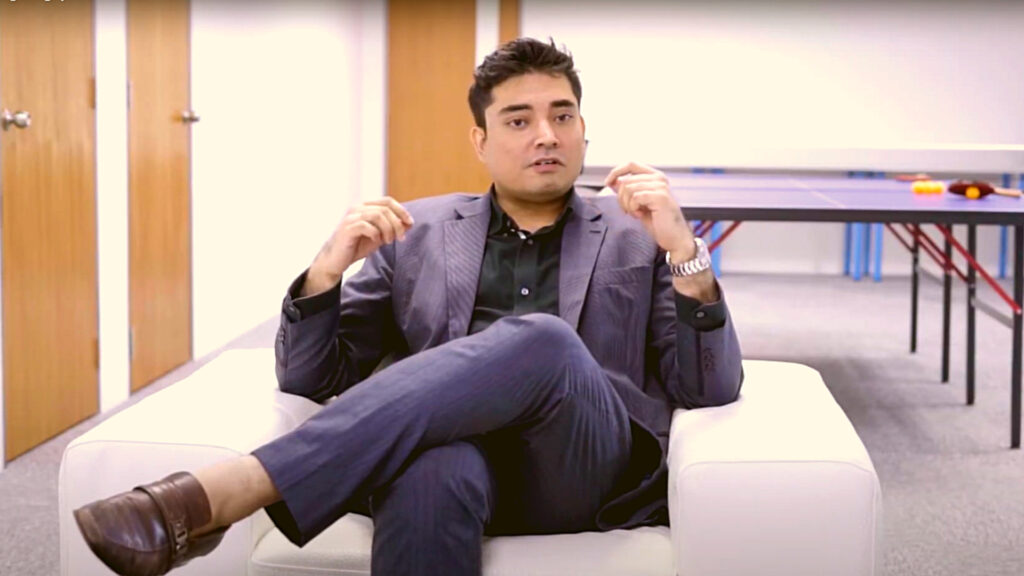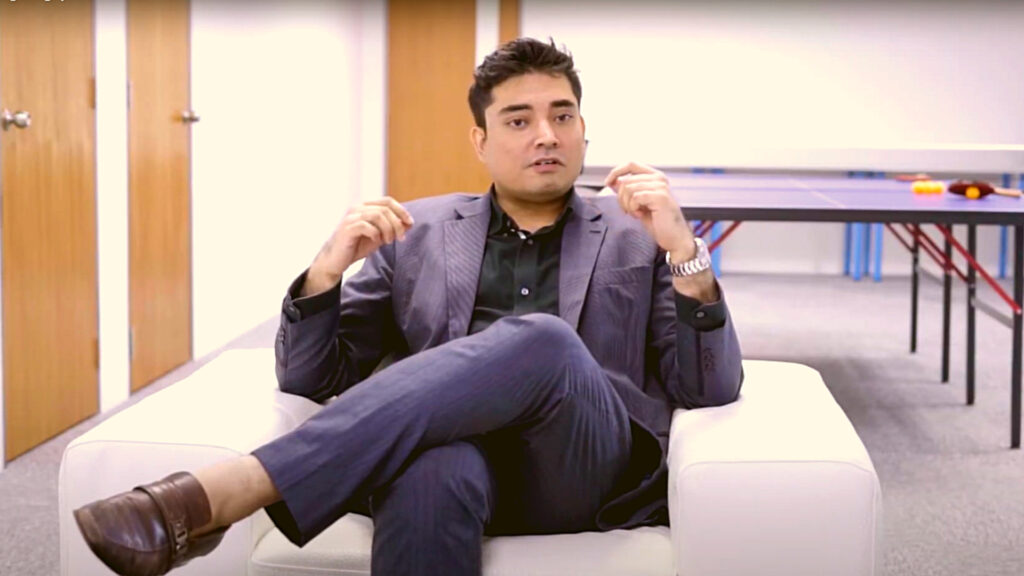Memory is an essential aspect of our lives, and it plays a crucial role in our day-to-day activities. Yet, many people struggle with memory challenges, and this is where Sancy Suraj comes in. Sancy Suraj is a renowned Memory Coach and Trainer based in Singapore, with over 12 years of experience in the field. He has helped more than 10,000 people worldwide to improve their memory skills through various techniques and strategies. In this article, we had the opportunity to interview Sancy Suraj and gain insights into his approach to memory coaching and training.

Can you tell us about your background and how you became interested in memory coaching and training?
Well, my interest in memory techniques began when I was studying for my university exams. I found myself struggling to retain the vast amount of information I needed to remember, and it was affecting my grades. That’s when I started to explore memory techniques, and I was amazed by how quickly and effectively they allowed me to recall information.
From there, my interest in memory techniques only grew stronger. I started attending memory improvement workshops and reading books on the topic, and eventually, I began to teach memory techniques to others. It was incredibly rewarding to see the impact that these techniques could have on people’s lives, whether they were students struggling to remember information for exams or working professionals looking to improve their productivity and efficiency.
Over time, my passion for memory coaching and training only continued to grow, and I began to specialize in the field. I’ve spent the past 12 years studying and teaching memory techniques, and I’ve had the opportunity to work with people from all walks of life, from students to CEOs. It’s been a truly fulfilling career, and I’m constantly inspired by the positive impact that memory improvement can have on people’s lives.
What are some of the most common memory challenges that people face? How do you help your clients overcome these challenges?
One of the most common memory challenges that people face is simply being able to remember information for long periods of time. Many people struggle to retain information after initially learning it, and this can be a major barrier to success in school, work, and everyday life. Another common challenge is remembering names and faces, which can be particularly challenging in social and professional situations.
To help my clients overcome these challenges, I teach them a range of memory techniques that are designed to improve their ability to retain and recall information. These techniques can range from simple strategies like repetition and visualization, to more advanced techniques like the Method of Loci and the Peg System.
For example, one technique that I often use with clients is called the Memory Palace, which involves visualizing a familiar location and mentally placing information in different parts of that location. This can be a powerful technique for improving long-term memory retention, as it creates a strong association between the information and the visual location.
Another technique that I use frequently is the Link Method, which involves creating visual associations between pieces of information. For example, if a client needs to remember a list of items, I might suggest that they create a mental image of each item linked to the next item in the list. This can be a highly effective way to improve short-term memory and recall.
Overall, there are a wide range of memory challenges that people can face, but by teaching them effective memory techniques and strategies, I’m able to help my clients overcome these challenges and achieve their goals.
Can you share some of the most effective memory techniques that you use with your clients? How do these techniques work, and how can someone apply them in their daily life?
There are many effective memory techniques that I use with my clients, but I’ll share a few of the most popular ones. The first is the Method of Loci, also known as the Memory Palace technique. This technique involves mentally placing information in different parts of a familiar location, such as a house or a street. By creating strong visual associations between the information and the location, it becomes much easier to remember the information later on. To apply this technique in daily life, someone could try mentally associating a to-do list with different parts of their house, for example.
Another effective technique is the Link Method, which involves creating visual associations between different pieces of information. For example, if someone needs to remember a list of groceries, they might create a mental image of the first item on the list linked to the second item, and so on. This technique works by creating strong visual connections between the items, making it easier to recall them later on.
The Peg System is another technique that can be highly effective. This involves mentally associating each item on a list with a specific peg, such as a number or a letter. For example, someone might associate the number 1 with a pencil, and then mentally link the first item on their list to the pencil. This technique works by creating a strong visual association between the peg and the item, making it easier to remember the information later on.
Overall, these memory techniques work by creating strong visual associations between pieces of information, making it easier for the brain to store and retrieve that information later on. With practice, anyone can learn these techniques and apply them in their daily life, whether they’re looking to improve their memory for work, school, or personal reasons.
“As a memory coach, I have seen the incredible power of memory techniques in improving memory performance. Whether you’re a student looking to ace your exams or a professional looking to remember important information at work, these techniques can be a game-changer. By creating strong visual associations between pieces of information, you can enhance your ability to store and retrieve that information later on. With practice and guidance, anyone can learn and apply these techniques to improve their memory skills and achieve their goals.”
How do you keep up with new developments in the field of memory training? Are there any recent advancements that have particularly caught your attention?
Certainly, staying up-to-date with new developments in the field of memory training is crucial for my work as a memory coach and trainer. One way I stay current is by attending conferences and workshops on memory training and related fields, such as neuroscience and psychology. These events provide opportunities to learn from experts in the field and to network with other professionals who share my interests.
I also stay up-to-date by reading scientific journals and books on memory and cognitive psychology. This allows me to stay informed about the latest research and to incorporate new findings into my training programs. Some recent advancements that have caught my attention include research on the use of virtual reality in memory training, as well as studies on the effectiveness of brain-training games and apps.
In addition to attending events and reading research, I also stay current by working closely with my clients and continually refining my training techniques based on their feedback and experiences. This helps me to identify areas where I can improve and to adapt my methods to meet the needs of different individuals and groups.
Overall, I believe that staying up-to-date with new developments in the field of memory training is essential for providing high-quality services to my clients. By staying informed and continuously learning, I can ensure that my training programs are effective, evidence-based, and tailored to the specific needs and goals of each individual client.
What role do lifestyle factors like sleep, diet, and exercise play in memory improvement? How do you incorporate these factors into your coaching and training?
That’s a great question. Lifestyle factors like sleep, diet, and exercise play a crucial role in memory improvement. In fact, research has shown that these factors can have a significant impact on cognitive function and overall brain health.
As a memory coach and trainer, I always emphasize the importance of maintaining a healthy lifestyle for optimal memory performance. For example, getting enough sleep is crucial for memory consolidation, as the brain uses this time to process and store information from the day. A lack of sleep, on the other hand, can impair memory function and make it more difficult to learn and remember new information.
Diet is also important for memory improvement. A diet high in processed foods and refined sugars has been linked to impaired cognitive function, while a diet rich in fruits, vegetables, whole grains, and healthy fats has been associated with better memory performance. Exercise is also crucial for memory improvement, as it increases blood flow and oxygen to the brain, promoting the growth of new brain cells and enhancing cognitive function.
When working with clients, I always incorporate lifestyle factors into my coaching and training. For example, I may provide recommendations for sleep hygiene and stress management techniques to help clients get better sleep. I may also provide guidance on healthy eating habits and suggest specific foods that are beneficial for brain health. Finally, I always encourage clients to engage in regular exercise and provide suggestions for types of physical activity that may be enjoyable and beneficial for cognitive function.
Overall, incorporating lifestyle factors into memory coaching and training is essential for promoting optimal brain health and cognitive function. By emphasizing healthy habits and providing guidance on nutrition, exercise, and sleep, I can help my clients achieve their memory improvement goals and improve their overall quality of life.
“As a memory coach, I believe that a healthy lifestyle is essential for optimal memory performance. By emphasizing the importance of sleep, diet, and exercise, I can help my clients achieve their memory improvement goals and enhance their overall brain health and cognitive function.”
We started the interview by asking Sancy about his background and what led him to become a memory coach and trainer. He shared that he first became interested in memory techniques during his university years when he was struggling to remember large amounts of information. He then delved into the world of memory improvement techniques and eventually became a memory coach and trainer to help others struggling with similar issues.
As we continued the interview, Sancy spoke about some of the common memory challenges that people face, such as forgetfulness and information overload. He explained how he helps his clients overcome these challenges through a combination of memory techniques, lifestyle changes, and mindset shifts. Sancy also shared some of the most effective memory techniques he uses with his clients, such as the Memory Palace technique and the Link method, and how these techniques work. We also asked Sancy about his approach to coaching clients with different learning styles and cognitive abilities. He explained how he tailors his coaching methods to suit each client’s unique needs, using a variety of techniques and strategies to ensure their success.

Can you share a success story of a client who was able to make significant improvements in their memory skills through your coaching and training?
Absolutely. I’ve had many clients who have made significant improvements in their memory skills through my coaching and training programs. One particular success story that comes to mind is a client I worked with who was struggling with memory loss due to a medical condition.
When this client first came to me, they were feeling very discouraged and frustrated by their memory difficulties. They were struggling to remember important information at work and in their personal life, and felt like their memory issues were holding them back from achieving their goals.
Through my coaching and training, we worked together to develop personalized memory techniques and strategies that were tailored to their specific needs and challenges. We focused on techniques such as visualization, association, and repetition, and practiced these techniques in a variety of contexts to ensure they were effective in real-world situations.
Over time, my client began to notice significant improvements in their memory skills. They were able to remember important information at work and in their personal life more consistently, and felt more confident and in control of their memory function. They were even able to take on new challenges and responsibilities at work that they had previously felt were out of reach.
Seeing this kind of progress and transformation in my clients is incredibly rewarding, and it’s what motivates me to continue doing this work. Memory training can have a profound impact on people’s lives, and I feel honored to be able to help people overcome their memory challenges and achieve their goals.
How important is mindset when it comes to improving memory skills? What are some mindset shifts that people can make to enhance their memory?
Mindset plays a crucial role in improving memory skills. In fact, I would say that it’s one of the most important factors in memory improvement. Having a positive and growth-oriented mindset can make all the difference when it comes to learning and applying memory techniques effectively.
One of the most important mindset shifts that people can make to enhance their memory is to let go of limiting beliefs about their own memory abilities. Many people believe that they simply have a “bad memory” and that there’s nothing they can do about it. This kind of fixed mindset can be very limiting and can prevent people from making progress in their memory skills. By adopting a growth mindset and believing that they can improve their memory with practice and effort, people can open themselves up to new possibilities and opportunities for learning and growth.
Another important mindset shift is to embrace mistakes and failures as a natural part of the learning process. Learning new memory techniques can be challenging, and it’s normal to make mistakes and experience setbacks along the way. By approaching these challenges with a growth mindset and seeing them as opportunities for learning and improvement, people can stay motivated and continue to make progress towards their memory goals.
Finally, it’s important for people to cultivate a sense of curiosity and openness when it comes to memory improvement. By approaching memory training with a sense of wonder and exploration, people can tap into their natural curiosity and creativity and discover new and innovative ways to improve their memory skills.
In my coaching and training programs, I work closely with my clients to help them cultivate a growth mindset and develop the mindset shifts that are necessary for successful memory improvement. By combining these mindset shifts with effective memory techniques and strategies, my clients are able to make significant progress in their memory skills and achieve their goals.
How do you approach coaching and training for clients with different learning styles or cognitive abilities?
As a memory coach and trainer, I understand that every individual has their own unique learning style and cognitive abilities. Therefore, my approach to coaching and training varies based on the specific needs of each client.
When working with clients with different learning styles, I take the time to understand how they process and retain information best. Some clients may be visual learners, while others may learn better through auditory or kinesthetic methods. Once I have identified the client’s learning style, I tailor my coaching and training techniques accordingly. For example, I may use visual aids, such as diagrams or mind maps, for visual learners, while I may use role-playing or physical exercises for kinesthetic learners.
Similarly, when working with clients with different cognitive abilities, I adapt my coaching and training methods to suit their needs. For example, clients with ADHD or other attention-related disorders may require more frequent breaks during training sessions or may need to engage in physical activities to maintain their focus.
In addition, I also take into account each client’s motivation and goals when designing their coaching and training program. Some clients may be more motivated by competition or external rewards, while others may be more motivated by personal growth and development. By understanding each client’s unique motivation and goals, I can tailor my coaching and training approach to help them achieve their desired outcomes.
Overall, my approach to coaching and training is highly individualized and adaptable. I believe that by tailoring my methods to suit each client’s unique learning style and cognitive abilities, I can help them achieve optimal results and make significant progress in their memory skills.
Are there any particular challenges or issues that you find especially challenging to address in your coaching? How do you approach these challenges?
As a memory coach and trainer, I have encountered a variety of challenges and issues while working with clients. One of the most challenging issues that I face is helping clients overcome deeply ingrained habits or beliefs that are hindering their memory skills. For example, some clients may have a belief that they have a “bad memory” or that they are simply not capable of remembering certain types of information. These beliefs can be difficult to overcome and may require a significant amount of time and effort to address.
To approach these challenges, I use a combination of cognitive behavioral therapy (CBT) techniques and memory training exercises. By helping clients identify and challenge negative thought patterns and beliefs, I can begin to shift their mindset and create a more positive and empowering approach to memory improvement. Additionally, by using memory training exercises and techniques, I can help clients experience tangible improvements in their memory skills, which can further reinforce their belief in their own capabilities.
Another challenge that I face is helping clients who may be dealing with underlying health issues that affect their memory skills. For example, clients with Alzheimer’s or other forms of dementia may have limited ability to improve their memory skills. In these cases, my approach is to focus on helping the client maintain their current level of memory function and to support their overall wellbeing.
Overall, while there are certainly challenges and issues that arise in my coaching and training work, I approach these challenges with a combination of compassion, flexibility, and evidence-based techniques. By taking a client-centered approach and tailoring my methods to suit each individual’s unique needs and challenges, I am able to help clients make significant progress in their memory skills, even in the face of significant obstacles.
What advice would you give to someone who wants to improve their memory skills, but doesn’t know where to start?
If you’re looking to improve your memory skills but don’t know where to start, my first piece of advice would be to set clear and achievable goals. It’s important to have a specific idea of what you want to achieve with your memory skills, whether that’s being able to remember important dates, names, or facts for work or school, or simply improving your overall cognitive function. Once you have a clear goal in mind, you can begin to research and explore different memory techniques and training programs that can help you achieve your objectives.
Another important piece of advice is to start small and be consistent. Improving your memory is a gradual process that requires consistent effort over time. It’s important to start with small, achievable goals and to build from there, rather than trying to tackle too much at once. This could mean starting with simple memory exercises or techniques, such as mnemonic devices or visualization exercises, and gradually building up to more complex tasks.
Additionally, it’s important to take care of your overall health and wellbeing. A healthy lifestyle can have a significant impact on your memory skills, so be sure to get enough sleep, eat a balanced diet, exercise regularly, and manage stress and anxiety. By taking care of your overall wellbeing, you’ll be in a better position to focus on improving your memory skills.
Finally, don’t be afraid to seek out support and guidance from professionals or resources. Memory coaches and trainers can provide tailored guidance and support to help you achieve your goals, while books, online courses, and other resources can provide valuable information and tips on improving your memory. Remember, improving your memory is a journey, and it’s important to be patient and persistent in your efforts. With dedication and the right approach, anyone can improve their memory skills and achieve their goals.
“Improving your memory skills is a journey that requires clear goals, consistency, and dedication. By starting small and focusing on building healthy habits, you can gradually improve your cognitive function and memory skills. Seeking support and guidance from professionals and resources can also be valuable in your journey. Remember, with patience and persistence, anyone can improve their memory skills and achieve their goals.”
In conclusion, Sancy Suraj’s insights and expertise in the field of memory coaching and training are invaluable to anyone looking to improve their memory skills. From his effective memory techniques to his emphasis on lifestyle factors and mindset, Sancy’s approach to memory improvement is holistic and tailored to each individual’s needs. We hope that this article has provided you with valuable insights into the world of memory improvement and inspired you to take the first steps towards enhancing your memory skills.










